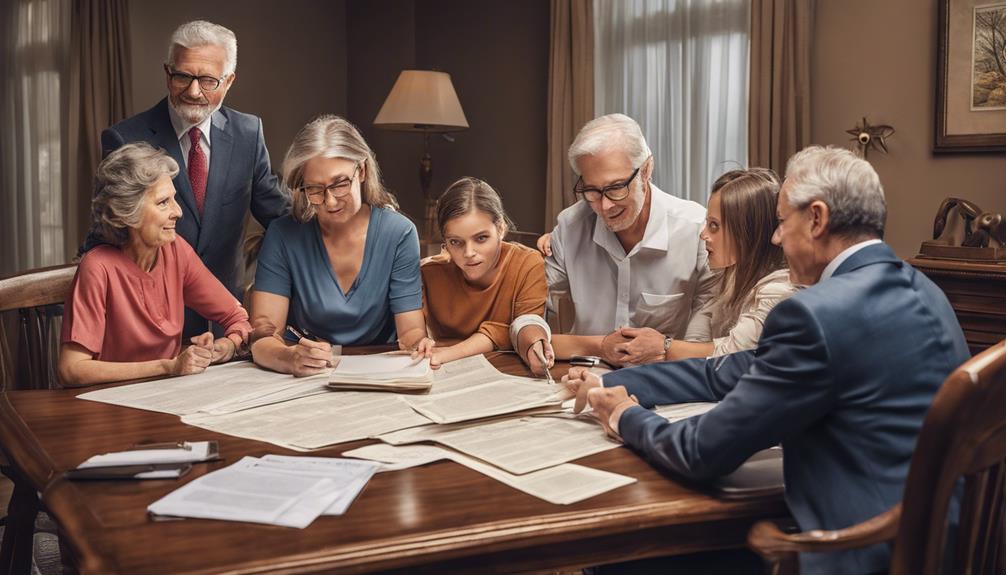Picture a finely crafted tapestry of compassion and decisions intricately intertwined to form a serene path. Pat Deegan, RN, welcomes us to step into a realm where hope guides the way to the end of life.
As we navigate the intricacies of planning ahead, we realize the power of preparation. The episode unveils the intricate layers of considerations vital for a well-thought-out end-of-life strategy.
Join us as we explore the profound impact of proactive steps and the comfort they bring.
Key Takeaways
- Early discussions lead to clarity and peace of mind.
- Choosing a Medical Power of Attorney is crucial.
- Regularly update advanced directives for honored wishes.
- Engage in open conversations to ensure loved ones are prepared.
Understanding End-of-Life Planning
Understanding end-of-life planning is a vital step in ensuring that your wishes are honored and your loved ones are well-prepared for the future. When it comes to planning for the end of life, considerations such as nursing home arrangements, caregiver support, estate planning, and advanced directives play a crucial role in shaping the outcome. By discussing these topics openly and proactively, individuals can make informed decisions that reflect their values and beliefs.
Incorporating advanced directives, like living wills and medical power of attorney, into your end-of-life plan ensures that your preferences regarding medical treatment and care are clearly outlined. Estate planning helps organize your assets, debts, and property distribution, alleviating financial burdens on your family. Additionally, discussing nursing home options and caregiver responsibilities allows for smoother transitions and better support during challenging times.
Benefits of Early Discussions

Starting conversations early about end-of-life planning can provide a sense of clarity and peace of mind, ensuring that personal wishes are known and honored when the time comes. Research indicates that families who engage in these discussions experience less stress and uncertainty when faced with critical situations.
By involving caregivers like Diane Carbo early on, misunderstandings and conflicts can be prevented, leading to smoother decision-making processes. Early planning allows for adjustments over time, ensuring that choices align with individual values and beliefs.
These conversations not only benefit the individual but also lead to more meaningful and supportive interactions with loved ones. Embracing the guidance of professionals like Pat Deegan RN can facilitate these discussions, offering expertise and compassionate support throughout the planning process.
Therefore, initiating early discussions about end-of-life planning can yield numerous advantages, promoting understanding, harmony, and a sense of preparedness for the future.
Essential Considerations for Planning
Establishing clear and detailed end-of-life plans is essential for ensuring that individual preferences are respected and carried out effectively. When considering end-of-life planning, it's crucial to have a comprehensive strategy in place to guarantee your wishes are honored.
Here are three essential considerations to keep in mind:
- Choosing a Medical Power of Attorney: Selecting a trusted individual to act as your medical power of attorney is vital. This person will make healthcare decisions on your behalf if you're unable to do so. Ensuring this individual understands your values and preferences is key to effective decision-making.
- Regular Review and Updates: Regularly reviewing and updating your end-of-life documents is essential. Circumstances can change, so it's important to ensure that your plan reflects your current wishes accurately.
- Peace of Mind: Having a plan in place provides peace of mind for both you and your loved ones. Knowing that your preferences will be followed can alleviate anxiety and uncertainty, providing a sense of security during challenging times.
Proactive Steps for End-of-Life Wishes

As we navigate the process of end-of-life planning, taking proactive steps to articulate our wishes can empower us to ensure our preferences are respected and honored.
Regularly updating advanced directives is crucial to accurately reflect our end-of-life wishes.
Assigning a trusted loved one as a healthcare proxy can provide support in making medical decisions aligned with our preferences.
Discussing important things like end-of-life plans with family members can prevent conflicts and ensure everyone is on the same page when critical decisions need to be made.
Considering organ donation and body donation options in advance can ease decision-making processes during challenging moments.
Open communication with healthcare providers about living wills and hospice preferences is essential for receiving appropriate care tailored to our needs.
Ensuring Loved Ones Are Prepared
To ensure our loved ones are prepared for the future, discussing end-of-life plans is crucial to alleviate stress and ensure clarity in times of need. When it comes to planning ahead, there are several key steps we can take to make sure our loved ones are well-prepared:
- Engage in Open Conversations: Initiate discussions with family members about end-of-life wishes and preferences. This open dialogue can help everyone understand each other's desires and make informed decisions together.
- Create Necessary Documents: Ensure all essential documents are in place, such as advanced directives, wills, and assigning a medical power of attorney. Having these documents organized and accessible can ease the burden on loved ones during difficult times.
- Encourage Early Planning: Encouraging early discussions and documentation can help prevent misunderstandings and ensure that everyone's wishes are respected. By addressing these important matters proactively, we can help alleviate family stress and ensure a smoother process for everyone involved.
Frequently Asked Questions
How Can Cultural Beliefs and Traditions Impact End-Of-Life Planning?
When considering end-of-life planning, cultural beliefs and traditions play a significant role in shaping our decisions. These deeply held values influence everything from the type of care we receive to how we want to be remembered.
It's essential to acknowledge and respect these differences when supporting individuals through this process. By understanding and incorporating cultural perspectives, we can ensure that each person's end-of-life wishes are honored with sensitivity and dignity.
What Role Does Spirituality Play in the End-Of-Life Planning Process?
Spirituality plays a crucial role in end-of-life planning, guiding individuals through a journey of reflection, peace, and acceptance. It provides comfort, meaning, and a sense of connection to something greater than ourselves.
How Can Individuals Navigate Complex Family Dynamics When Discussing End-Of-Life Wishes?
When navigating complex family dynamics while discussing end-of-life wishes, we find that open communication and empathy are key.
By actively listening to each family member's concerns and values, we can create a safe space for sharing and understanding.
It's essential to approach these conversations with patience and respect for differing perspectives.
Together, we can work towards honoring everyone's needs and finding common ground for making important decisions about end-of-life care.
Are There Legal Considerations That Need to Be Taken Into Account When Creating an End-Of-Life Plan?
Absolutely, there are legal considerations to keep in mind when crafting an end-of-life plan. It's crucial to ensure that your wishes are documented clearly and legally binding.
Things like advance directives, wills, and power of attorney documents play a significant role in protecting your interests and ensuring your desires are respected.
Consulting with legal professionals can provide peace of mind and help navigate the complexities of legal requirements in this process.
How Can Individuals Ensure That Their End-Of-Life Wishes Are Carried Out if They Become Incapacitated?
Absolutely, ensuring that our end-of-life wishes are honored if we become incapacitated is crucial. We can achieve this by creating advance directives, such as a living will or a durable power of attorney for healthcare. These legal documents allow us to outline our preferences regarding medical care and appoint a trusted individual to make decisions on our behalf.
Regularly reviewing and updating these documents can help maintain alignment with our current wishes.
Conclusion
As we wrap up our discussion on the importance of end-of-life planning, remember that procrastination is the thief of time. So let's not wait until it's too late to have those difficult conversations and make our wishes known.
By taking proactive steps now, we can ensure that our loved ones are prepared and have peace of mind knowing they're honoring our wishes. It's never too early to start planning for the inevitable.









